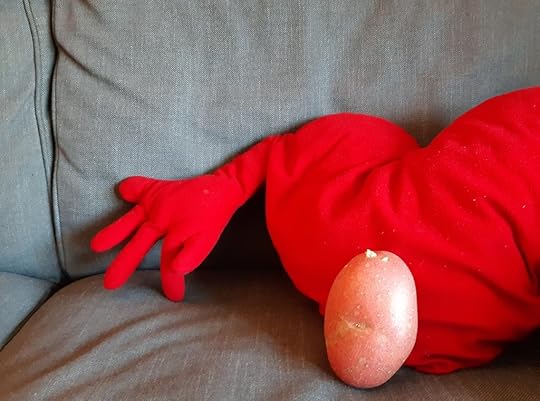The Pun-filled History of the Phrase Couch Potato
Hello,
I’ve been gathering a collection of useful word books in recent years and this week’s term, couch potato, is thanks to one of them – “The Oxford Dictionary of New Words” (Oxford University Press, 1991) which I picked up second-hand. I’m familiar with the idea of a couch potato being a person who likes to lounge on the sofa with TV remote control in hand, but I had no idea we knew exactly who coined the phrase, or that there were clubs, puns, and even trademarks involved.
Let’s do the basics first. Couch has been in English since the mid 1300s as a word for a bed, borrowed from Old French couche (bed or lair) thanks to the verb coucher (to lie) and ultimately from Latin collocare (to lay in place) which is from com (with) and locare (to place). Locus is the Latin for place, which is also imported into English – think about local, for example. The idea of sitting on a couch arose in English from the mid 1400s, a long seat which you reclined upon. It became associated with psychoanalysis in the 1950s.
I had no idea of the differences between various words for couch, so I’ll include them here. Couch has the head end only raised and half a back. A sofa has a full back and both ends raised. A settee has a full back but may omit the arms. An ottoman has neither back nor arms. A divan has neither back nor arms but rests against a wall, giving some back support. In my experience couch, sofa, and settee have been used interchangeably. How about you?
Potato joined English in the 1560s from Spanish patata and before that from batata, a word in the Carib language of Haiti. The word was imported alongside sweet potatoes which were grown in Spain at that time and later in Virginia, America by 1648. If you see potato mentioned in English up to the mid 1600s, it was sweet potatoes they are talking about. The common white potato arrived in Europe from Peru and was given the same name due to their visual similarity.
The first potato arrived to Europe and Pope Paul III in 1540. They were grown initially as ornamental plants in France (there’s a wonderful story about Parmentier and his role in encouraging the French to eat potatoes – I covered this on my radio spot). They arrived in Ireland, according to tradition, thanks to John Hawkins in 1565.
Other languages had fun with naming this new vegetable. German’s Kartoffel comes from truffle in Latin and Italian. French’s pomme de terre (earth apple) always amused me and Swedish has jordpäron (earth pear). Dropping something like a hot potato dates to 1824 and the one potato, two potato counting rhyme is recorded in 1885 in Canada.
 A couch potato in its natural habitat
A couch potato in its natural habitatThe couch potato term dates to 1976. It is based on the idea that a person shaped like a potato spends most of their time on a couch. It was coined by American Tom Iacino via a pun. The original American term was boob tubers because the boob tube was slang for TV there. In Britain a boob tube was a short stretch fabric top for women. Then cartoonist Robert Armstrong drew a sketch of a potato (the best known tuber vegetable) reclining on a couch watching a TV and we went from boob tubers to couch tubers and couch potatoes. He also formed a club called the Couch Potatoes and registered the term as a trademark in 1976.
Robert popularised the term and sold couch potato merchandise but claimed it was Tom who had coined it when asking to speak to another member of the club on the telephone. Robert campaigned to raise the self-esteem of couch potatoes in an era of growing emphasis on physical fitness and even went as far as to say “watching TV is an indigenous American form of meditation” in a 1988 interview in “Parade”.
I’m not sure about that claim and I love getting out for a walk, but I’m always pro-potato. After all my unofficial family motto is “I never met a carbohydrate I didn’t like”.
Until next time, happy reading, writing, and wordfooling,
Grace
p.s. I’ve already covered the origin of the word spud, if you’re curious.



